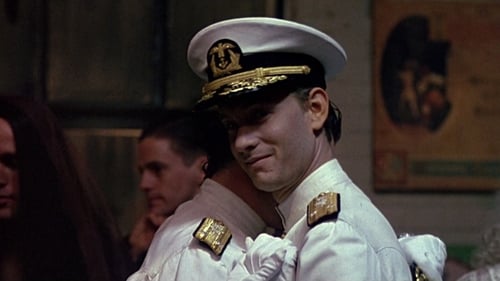Jan Oxenberg
История
Jan Oxenberg is an American film producer, director, editor, and screenwriter. She is known for her work in lesbian feminist films and in television.

Writer
Фильм состоит из пяти коротких историй, каждая из которых названа именем главного героя (Люси, Эдди, Эллисон, Грейс и Мегги). Пятерых персонажей объединяет один недуг: психическое расстройство.

Herself
A collection of interviews recorded for the making of the 1995 documentary "The Celluloid Closet," on the subject of LGBT representation in film history.

Self
Фильм посвящен теме гомоэротизма в кинематографе англоязычных стран. Это очерк о том, как показывали на экране нетрадиционные сексуальные отношения, начиная от немого фильма Эдисона и заканчивая такими известными лентами как «Филадельфия» и «Основной инстинкт».

Producer
Director Jan Oxenberg's docu-fantasy narrative about aging and death, and how it affects her family.

Writer
Director Jan Oxenberg's docu-fantasy narrative about aging and death, and how it affects her family.

Director
Director Jan Oxenberg's docu-fantasy narrative about aging and death, and how it affects her family.

Jan Oxenberg’s charmingly raw, politically-charged and remarkably funny celebration of the American lesbian experience validates the nuanced voice of a community otherwise underrepresented in the Wild West of mid-’70s independent filmmaking. In an attempt to combat the pervasive misconception of the “humorless, angry feminist,” the vignettes in A Comedy in Six Unnatural Acts experiment with self-aware yet playful depictions of common stereotypes, such as the “Stompin’ Dyke” or the butch-femme couple. In the process, Oxenberg’s short film reclaims those insults and assumptions as newfound, loaded weapons—to deploy on her own terms, of course. (UCLA Film & Television Archive)

Director of Photography
Jan Oxenberg’s charmingly raw, politically-charged and remarkably funny celebration of the American lesbian experience validates the nuanced voice of a community otherwise underrepresented in the Wild West of mid-’70s independent filmmaking. In an attempt to combat the pervasive misconception of the “humorless, angry feminist,” the vignettes in A Comedy in Six Unnatural Acts experiment with self-aware yet playful depictions of common stereotypes, such as the “Stompin’ Dyke” or the butch-femme couple. In the process, Oxenberg’s short film reclaims those insults and assumptions as newfound, loaded weapons—to deploy on her own terms, of course. (UCLA Film & Television Archive)

Editor
Jan Oxenberg’s charmingly raw, politically-charged and remarkably funny celebration of the American lesbian experience validates the nuanced voice of a community otherwise underrepresented in the Wild West of mid-’70s independent filmmaking. In an attempt to combat the pervasive misconception of the “humorless, angry feminist,” the vignettes in A Comedy in Six Unnatural Acts experiment with self-aware yet playful depictions of common stereotypes, such as the “Stompin’ Dyke” or the butch-femme couple. In the process, Oxenberg’s short film reclaims those insults and assumptions as newfound, loaded weapons—to deploy on her own terms, of course. (UCLA Film & Television Archive)

Producer
Jan Oxenberg’s charmingly raw, politically-charged and remarkably funny celebration of the American lesbian experience validates the nuanced voice of a community otherwise underrepresented in the Wild West of mid-’70s independent filmmaking. In an attempt to combat the pervasive misconception of the “humorless, angry feminist,” the vignettes in A Comedy in Six Unnatural Acts experiment with self-aware yet playful depictions of common stereotypes, such as the “Stompin’ Dyke” or the butch-femme couple. In the process, Oxenberg’s short film reclaims those insults and assumptions as newfound, loaded weapons—to deploy on her own terms, of course. (UCLA Film & Television Archive)

Writer
Jan Oxenberg’s charmingly raw, politically-charged and remarkably funny celebration of the American lesbian experience validates the nuanced voice of a community otherwise underrepresented in the Wild West of mid-’70s independent filmmaking. In an attempt to combat the pervasive misconception of the “humorless, angry feminist,” the vignettes in A Comedy in Six Unnatural Acts experiment with self-aware yet playful depictions of common stereotypes, such as the “Stompin’ Dyke” or the butch-femme couple. In the process, Oxenberg’s short film reclaims those insults and assumptions as newfound, loaded weapons—to deploy on her own terms, of course. (UCLA Film & Television Archive)

Director
Jan Oxenberg’s charmingly raw, politically-charged and remarkably funny celebration of the American lesbian experience validates the nuanced voice of a community otherwise underrepresented in the Wild West of mid-’70s independent filmmaking. In an attempt to combat the pervasive misconception of the “humorless, angry feminist,” the vignettes in A Comedy in Six Unnatural Acts experiment with self-aware yet playful depictions of common stereotypes, such as the “Stompin’ Dyke” or the butch-femme couple. In the process, Oxenberg’s short film reclaims those insults and assumptions as newfound, loaded weapons—to deploy on her own terms, of course. (UCLA Film & Television Archive)

Herself
Filmmaker Jan Oxenberg narrates her own home videos, commenting on how her views towards lesbianism and femininity have evolved over time.

Director
Filmmaker Jan Oxenberg narrates her own home videos, commenting on how her views towards lesbianism and femininity have evolved over time.

Artist/ Three Women +
Held in 1972 at 533 N. Mariposa Street, Los Angeles was one of the most important cultural events in the United States: "Womanhouse," a feminist art installation and performance space organized by Judy Chicago and Miriam Schapiro.

Director
A women interviews a roller derby skater.













